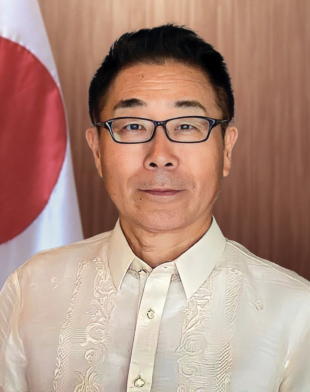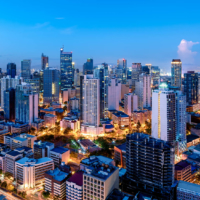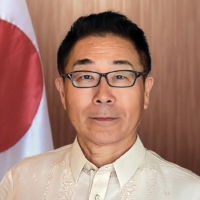2023 marks the 125th anniversary of Philippine independence and also holds great significance for both Japan and the Philippines as the 120th anniversary of the arrival of the first Japanese immigrants.
Before the war, more than 20,000 Japanese moved to the southern Philippine province of Davao on Mindanao to cultivate abaca and produce Manila hemp, greatly contributing to Davao’s development. Just like in Baguio in the northern Philippines, where Japanese immigrants engaged in road construction, a prosperous Japanese community was established in the country. To this day, their descendants continue to be the foundation of friendship between our nations.

In Hibiya Park near the Imperial Palace in Tokyo, one can find the bronze bust of Dr. Jose Rizal and a monument honoring President Elpidio Quirino, a testament to the deep friendship and shared history that binds Japan and the Philippines. Having overcome the trials of war through the efforts and dedication of their predecessors, both countries are now working together toward a better future. As this year also marks the 70th anniversary of Quirino’s decision to pardon Japanese war criminals imprisoned in the Philippines, I would like to reiterate my heartfelt gratitude to the Filipino people for their forgiving and noble spirit.
Thanks to the sincere efforts of citizens from both countries, Japan-Philippines relations have developed into a strategic partnership rooted in mutual respect and confidence, with about 80% of Filipinos saying that they trust Japan. Strong bilateral ties have been established at all levels, as eloquently expressed by President Ferdinand R. Marcos, Jr., describing Japan as “a most reliable partner” during his official visit to the Philippines in February.
Japan aims to further deepen its cooperation with like-minded countries to realize a “free and open Indo-Pacific,” and the Philippines holds a special position among them. As neighboring maritime nations and strategic partners sharing the fundamental values of freedom and democracy, Japan and the Philippines have a mutual interest in upholding the rule of law and freedom of navigation in the oceans. We stand firm against unilateral attempts to change the status quo by force in the East and South China seas. Amid serious challenges threatening the security and welfare of the international community, we are committed to maintaining and strengthening peace and the free and open international order that our predecessors strove hard to build after the war.
Since the end of World War II, Japan has consistently contributed to the Philippines’ reconstruction and economic development, becoming our top direct investor and official development assistance donor. We hope to contribute toward further development that will uplift the lives of Filipinos through vital joint infrastructure ventures, such as the construction of the Metro Manila Subway System. In recent years, we have also made great strides in our maritime law enforcement and defense collaboration, and we look forward to strengthening our security partnership even more. We have seen our people-to-people exchanges flourish as numerous Filipinos contribute to Japanese society, and the Philippines has become a popular destination for Japanese tourists and students of English.
Going forward, I trust that Japan-Philippines relations will grow ever more vibrant and contribute to the enduring stability and greater prosperity of the Indo-Pacific region.




